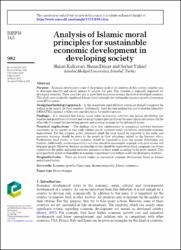| dc.contributor.author | Kalkavan, Hakan | |
| dc.contributor.author | Dinçer, Hasan | |
| dc.contributor.author | Yüksel, Serhat | |
| dc.date.accessioned | 2021-12-22T07:12:19Z | |
| dc.date.available | 2021-12-22T07:12:19Z | |
| dc.date.issued | 2021 | en_US |
| dc.identifier.citation | Kalkavan, H., Dinçer, H. ve Yüksel, S. (2021). Analysis of Islamic moral principles for sustainable economic development in developing society. International Journal of Islamic and Middle Eastern Finance and Management, 14(5), 982-999. https://doi.org/10.1108/IMEFM-07-2019-0271 | en_US |
| dc.identifier.issn | 1753-8394 | |
| dc.identifier.issn | 1753-8408 | |
| dc.identifier.uri | https://doi.org/10.1108/IMEFM-07-2019-0271 | |
| dc.identifier.uri | https://hdl.handle.net/20.500.12511/8705 | |
| dc.description.abstract | Purpose
Economic development is one of the primary goals of all countries. In this context, countries aim to determine effective and correct policies to achieve this goal. This situation is especially important for developing countries. These countries aim to grow their economies to reach the level of developed countries. This study aims to identify significant Islamic moral principles for sustainable economic growth of emerging seven (E7) countries.
Design/methodology/approach
In this framework, eight different criteria are defined to improve the welfare in the society for these countries. Additionally, fuzzy decision-making trial and evaluation laboratory (DEMATEL) approach is taken into consideration in the analysis process.
Findings
It is identified that Islamic moral values in economic activities, fair income distribution and taxation and prohibition of interest and securing business partnership are the most significant criteria. On the other side, it is found that preventing poverty and avoiding wastage are the influenced factors.
Practical implications
The findings show that righteousness in commercial activities decreases uncertainty in the market so that trade volume can be increased which contributes sustainable economic improvement. For this purpose, public awareness about the issue should be improved in the media and necessary trainings should be given to the people in their educations related to the business ethics. Furthermore, legal system in these countries should be improved to have fair income distribution and taxation. Additionally, social responsibility activities should be encouraged, so people with good income will help poor people. Moreover, business partnership system should be improved in which companies can obtain capital from the public and make necessary payments to these people according to the profit amount. This issue positively affects sustainability in economic improvement and welfare society for developing countries.
Originality/value
There are limited studies on sustainable economic development based on Islamic moral-based factors. | en_US |
| dc.language.iso | eng | en_US |
| dc.publisher | Emerald Group Holdings Ltd. | en_US |
| dc.rights | info:eu-repo/semantics/embargoedAccess | en_US |
| dc.subject | Economic Growth | en_US |
| dc.subject | Fuzzy Logic | en_US |
| dc.subject | Income Inequality | en_US |
| dc.subject | Islamic Economics | en_US |
| dc.title | Analysis of Islamic moral principles for sustainable economic development in developing society | en_US |
| dc.type | article | en_US |
| dc.relation.ispartof | International Journal of Islamic and Middle Eastern Finance and Management | en_US |
| dc.department | İstanbul Medipol Üniversitesi, İşletme ve Yönetim Bilimleri Fakültesi, Uluslararası Ticaret ve Finans Bölümü | en_US |
| dc.authorid | 0000-0003-4482-0505 | en_US |
| dc.authorid | 0000-0002-8072-031X | en_US |
| dc.authorid | 0000-0002-9858-1266 | en_US |
| dc.identifier.volume | 14 | en_US |
| dc.identifier.issue | 5 | en_US |
| dc.identifier.startpage | 982 | en_US |
| dc.identifier.endpage | 999 | en_US |
| dc.relation.publicationcategory | Makale - Uluslararası Hakemli Dergi - Kurum Öğretim Elemanı | en_US |
| dc.identifier.doi | 10.1108/IMEFM-07-2019-0271 | en_US |
| dc.identifier.wosquality | Q3 | en_US |
| dc.identifier.scopusquality | Q2 | en_US |


















